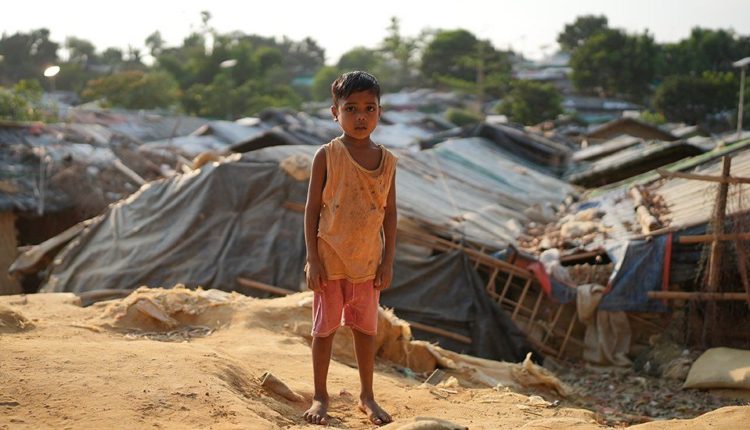Anwar Sadiq was just hours old when a BBC team first met him in a refugee camp in Bangladesh in September 2017.
A thin cotton cloth was all his mother Mohsena had to cover him, as she cradled her tiny baby under a flimsy makeshift tent, on an empty patch of land.
Five years on, the life of the little boy who entered the world in the most precarious of circumstances remains fragile.
He’s one of half a million children growing up here amid hunger, disease and trauma with little prospect of things getting better – in the camp there is no formal education and few chances of getting a job.
Anwar was born into a life of chaos and danger. His young parents were part of a mass exodus of Rohingya people, who fled their villages in Myanmar in fear, carrying nothing.
“I used to think I would bring him up in a beautiful and peaceful world,” Mohsena told us at the time, “but I am in a refugee camp and this is not a beautiful place at all.”
Now close to a million people live here, surrounded by barbed wire fences and cut off from the outside world.
They fled Myanmar forces who are accused of systematically murdering, raping and torturing the minority Rohingya population – last year the US government said they had committed genocide.
With the very same military now running their homeland, since a coup in 2021, Rohingya refugees have very little chance of going back.
We tracked Anwar down in the vast maze of congested and narrow lanes, which make up what has become the world’s largest refugee camp, near the seaside town of Cox’s Bazar.
We couldn’t believe we were able to find the family, amongst the endless rows of identical bamboo shelters.
In 2017 they were living in the open with no fixed address. Even now they still don’t own a mobile phone.
Today, Anwar has grown into a wide-eyed, shy little boy. He clings tightly to his mother much of the time – resting his head on her lap, he tugs at her pink headscarf.
He also has two younger sisters, two-year-old Sadeqa, and Almar Rufa, who is nearly one.
While the family no longer have to stay under canvas, where they live today is barely better.
They share a modest one-room shelter which has no windows to bring the light in. There are no fans to cool from the sticky heat, and very little ventilation.
Anwar and his sisters don’t even have a bed to sleep in – a mat donated by the United Nations provides scant relief from the hard concrete floor.
Their few possessions – metal pots and pans, and some clothes strung up on a washing line – have all been given to them by aid agencies.
“Back in Myanmar we had a big strong house made of wooden planks, we owned land, and we farmed it to make a living,” Mohsena says.
She was just 15 and heavily pregnant when she escaped Myanmar’s military in September 2017, with her husband, Nurul Haq.
Her uncle was shot and killed while he was out fishing and Mohsena feared that if they didn’t leave soon, her family would be next.
Mohsena walked barefoot for days, her ankles swollen.
Just as she was crossing the river to neighbouring Bangladesh, her contractions started.
The rickety wooden boat she was in capsized and Mohsena thought she and her unborn baby would drown – her husband saved them.
Tired and drenched, the couple kept going until they made it to a hospital close to the border, where Anwar was born.
It’s amazing he survived. But a few months ago, Mohsena ended up back at the same facility near the camps, worried again that she’d lose Anwar.
He’d come down with fever, his heart was racing and he wouldn’t stop coughing. Doctors said he had pneumonia.
Barely a week goes by without Anwar or his siblings falling sick.
Living conditions for the children in the camp are squalid and unsanitary – they play next to piles of rubbish, inhaling the pungent fumes emanating from the thick black streams of open sewage.
Source: BBC


Comments are closed.